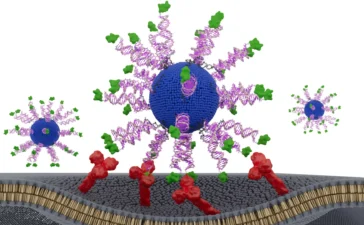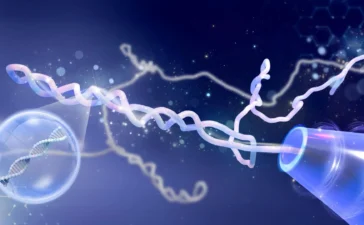Wear and tear on plastic products releases small to nearly invisible plastic particles, which could impact people’s health when consumed or inhaled. To make these particles biodegradable, researchers created plastics from plant starch instead of petroleum. An initial study published in ACS’ Journal of Agricultural and Food Chemistry shows how animals consuming particles from this alternative material developed health problems such as liver damage and gut microbiome imbalances.
“Biodegradable starch-based plastics may not be as safe and health-promoting as originally assumed,” says Yongfeng Deng, the corresponding author of the study.
Microplastics (plastic pieces less than 5 millimeters wide) are entering human bodies through contaminated water supplies, foods and drinks — and even IV infusions. Scientists have linked plastic particles in the bloodstream and tissues to various health risks. For example, a study found that people with inflammatory bowel disease have more microplastics in their feces. Biodegradable plastics have been presented as a safer, more environmentally friendly alternative to traditional petroleum-based plastics. One of the most common types comes from starch, a carbohydrate found in potatoes, rice and wheat. However, there is a lack of information on how starch-based biodegradable plastics affect the body. A team of researchers led by Deng tackled this issue by exploring these effects in animal trials.
The researchers compared three groups of five mice: one group consuming normal chow and two groups consuming food infused with starch-based microplastics. The doses (low and high) were calculated and scaled from what an average human is expected to consume daily. They fed the mice for 3 months and then assessed the animals’ organ tissues, metabolic functions and gut microbiota diversity. Mice exposed to the starch-based plastic particles had:
- Multiple damaged organs, including the liver and ovaries, with more pronounced damage in the high-dose group. However, mice eating normal chow showed normal organ tissue biopsies.
- Altered glucose management, including significant abnormality in triglycerides (a type of fat) and disruption in molecular biomarkers associated with glucose and lipid metabolism, compared to mice fed normal chow.
- Dysregulated genetic pathways and specific gut microbiota imbalances, which the researchers suggest could alter microplastic-consuming animals’ circadian rhythms.
“Prolonged low-dose exposure to starch-based microplastics can lead to a broad spectrum of health impacts, particularly perturbing circadian rhythms and disrupting glucose and lipid metabolism,” says Deng. However, the researchers acknowledge that because this is one of the first studies examining the impacts of consuming starch-based microplastics, further research is needed to understand how these biodegradable particles break down in the body.
The authors acknowledge funding from the Natural Science Foundation of China, the Jiangsu Province Young Science and Technology Talent Support Program, the Joint Fund of Departments and Schools, the Start-up Research Fund, and the Zhishan Young Scholars Fund of Southeast University by the Fundamental Research Funds for the Central Universities.
You Might Also Like
This reengineered HPV vaccine trains T cells to hunt down cancer
Over the last decade, scientists at Northwestern University have identified a key insight about how vaccines work. The ingredients matter,...
This planet friendly diet could cut your risk of early death by 23%
New research from Aarhus University suggests that the updated Nordic dietary guidelines, created to support both personal health and environmental...
Scientists discover protein that rejuvenates aging brain cells
Scientists at the Yong Loo Lin School of Medicine at the National University of Singapore have identified a protein that...
Scientists were wrong for decades about DNA knots
Scientists at the University of Cambridge, working with international collaborators, have identified a crucial process that shapes how DNA behaves...









